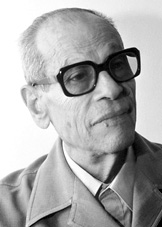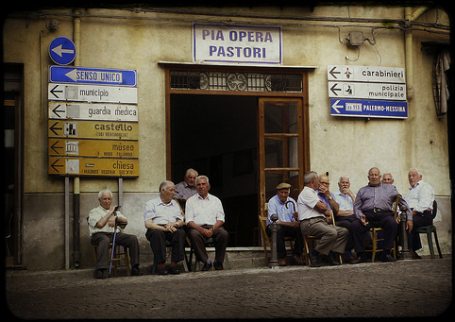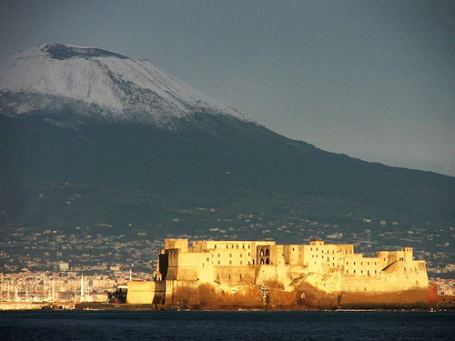Secrecy & Omertà
At the end of an earlier post we had invited Naguib Mahfouz (see picture below), the Nobel-prize Egyptian writer, to help us to understand the ancient world of the Mediterranean. Let’s consider today how the charming characters in his Cairo trilogy do tons of forbidden things: they drink alcohol, they cheat and eat pork, but all is done in secret and keeping up the appearances.
Two daughters of Ahmed Abd el-Gawwad – this Egyptian patriarch par excellence and main character of the trilogy – quarrel and one of them angrily denounces her sister’s husband to her mother: “He drinks wine at home without hiding!”
Which reminds us of some Tunisian people who were drinking beer in a coffee house in Tunis and who confessed: “Nous on fait tout, mais en cachette” (we do everything, though in secret).
It is irresistible not to think about Sicily, where doing things in secret is well ingrained (Sicily was under Tunisian rule for 400 years). And what about omertà, which makes defeating Mafia so difficult?
Omertà is a code of silence that seals the lips of men even when innocent and protects mafiosi in Italian southern regions like Sicily, Calabria and Campania. We’re sure there is some connection between the said secrecy behaviour and Mafia’s omertà.
[By the way, is all this so remote from that omertà that protects Osama bin Laden in territories where everybody is so capable of keeping secrets? A weird association? Hard to say. Back to Mahfouz and to the Mediterranean]
The Power of Man on Woman
 Another element is the power a husband exerts on his wife. That same angry sister tells her mother about the other sister’s misdemeanours: “She drinks and smokes, acting against God and with Satan.”
Another element is the power a husband exerts on his wife. That same angry sister tells her mother about the other sister’s misdemeanours: “She drinks and smokes, acting against God and with Satan.”
Her disconsolate mother replies: “What can we do? She is a married woman, and the judgement of her conduct is now in the hands of her husband…” (I am freely summing up the text).
This is Islamic society, one could say. Ok, but this patriarchal power is much older than Islam and was present both in ancient Greece and Rome (although from the late Republic onwards Roman women – especially within the upper classes – gained a wider freedom). So it is a misconception to think of all this as Islamic. Many Muslim societies (not all of them) simply stick to ancient traditions widespread in the Mediterranean and elsewhere much before Islam arrived, which doesn’t mean we like women to be submitted to man’s power, no, no. And this is certainly not Italy’s contemporary life, even though in the South something of a more ancient patriarchy still seems to survive.
The honour of the family
Speaking of patriarchy, the honour and dishonour of the family falls upon the father or husband. Ahmed Abd el-Gawwad, called by his daughter’s mother-in-law because of his daughter’s misconduct, thus reproaches her: “Nothing that was raised in my house should be stained by such behaviours! Don’t you realise that the whole evil you are doing brings dishonour to me?”.
Again it is tempting to think about Neapolitan Eduardo De Filippo‘s Natale in casa Cupiello, a delightful comedy in which Luca Cupiello (Eduardo), exasperated with is wife Concetta, cries aloud: “La nemica mia! La nemica della casa!” (This enemy of mine! This enemy of the house!), where he clearly considers himself to be THE house, in such a funny and masterly way, because Eduardo and the Neapolitans are so refined and adorable (the Greek cousins of Rome) despite all the problems now Naples is facing.
And again it is clear that patriarchy is prior to Islam, Naples, Sicily etc. It was previously present in Rome, Greece, Carthage etc. And it existed in Mare Nostrum and elsewhere long before these civilisations arrived. Records of it seem to be as far back as the 4th millennium BC.
We have tried to explore some Mediterranean traditions with the help of Naguib Mahfouz, and we have mused about some possible influences between the North and South shores of this sea. It seems clear to us that every study of present ways of thinking (European, Islamic, Sicilian, Neapolitan etc.) is not wholly understandable without looking at the endless past of the civilizations (see also the concept of the mind like a museum in the last section of our post Knowing Thyself).
(to be continued)
Ψ
Other related posts:
Permanences I
The Southern Shores of the Mediterranean
Love Words from Egypt
Echoes from the Mediterranean. Part 1
Echoes from the Mediterranean. Part 2


